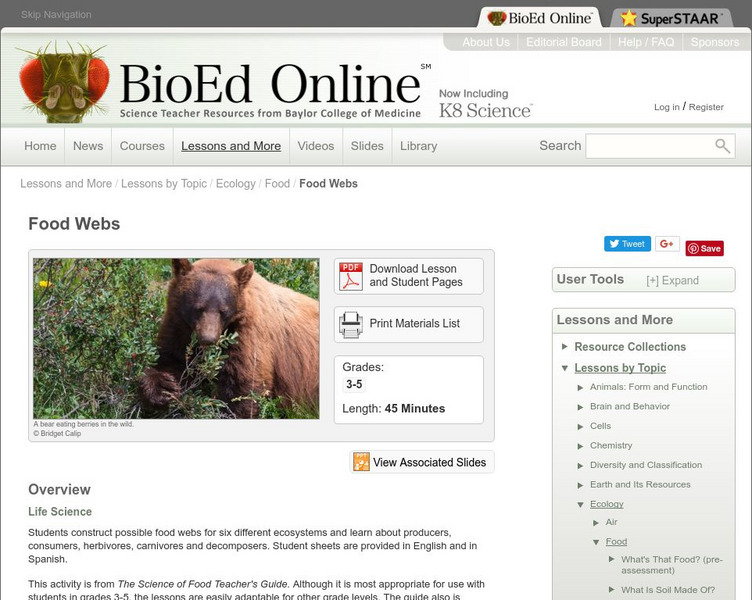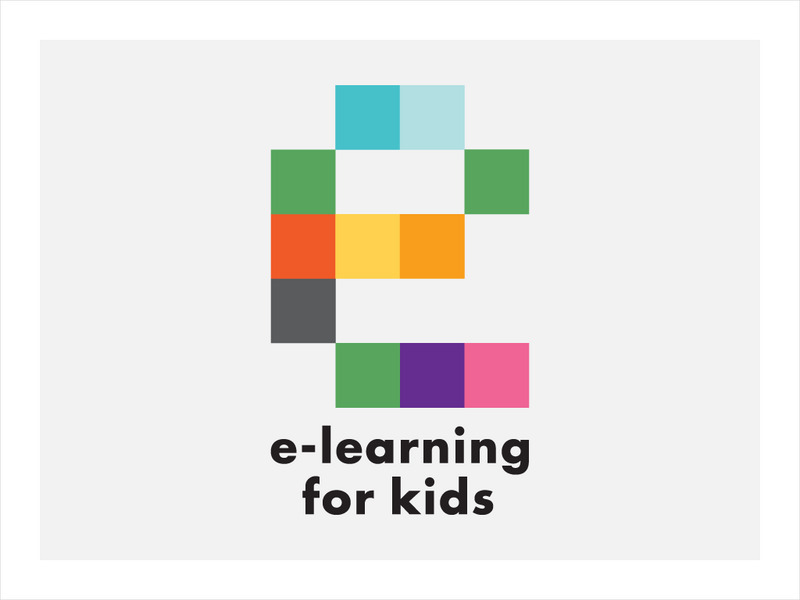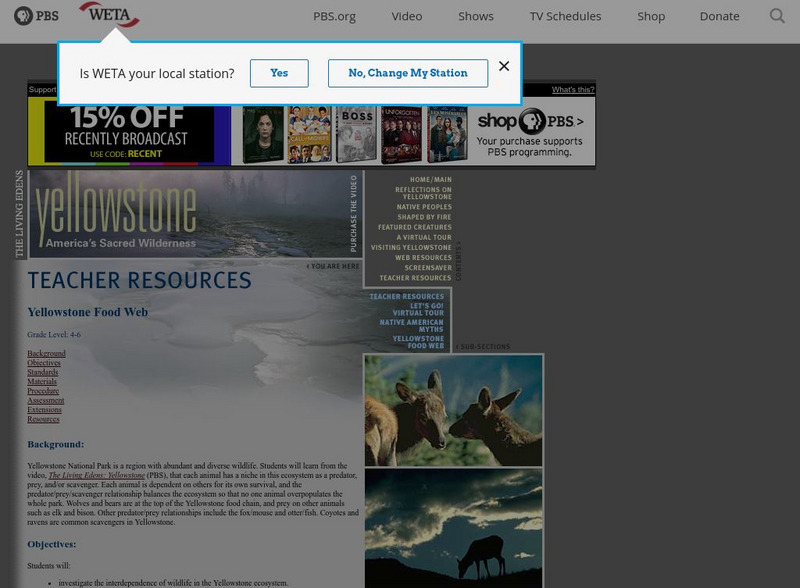Hi, what do you want to do?
Curated OER
Life Science Review for Grade 4
For this life science review for grade 4 worksheet, 4th graders answer 25 multiple choice questions in standardized test format about life science.
Curated OER
Birds of Wetlands Facts Table Activity
In this birds of wetlands worksheet, students create a table on the internet to insert facts of the birds in the wetlands. Students make a table for 9 birds.
Curated OER
Pond Ecosystem Field Trip
Students investigate the environment by participating in a class trip. For this pond ecosystem lesson, students define a list of vocabulary terms associated with ponds such as invertebrate and metamorphosis. Students attend a field trip...
Curated OER
Quiz about Animals
In this animals worksheet, learners complete multiple choice questions about different animals, what they eat, and where they live. Students complete 10 questions.
Curated OER
Spelling List 12: Sight Words, "ure" Pattern, and Academic Vocabulary
For this spelling list worksheet, students practice spelling words that are sight words, ure pattern, and vocabulary. Students practice spelling 21 words total.
Curated OER
Aquatic Ecosystems
Students study ponds and wetland ecosystems and examine the food chains and webs in them. In this aquatic ecosystems lesson students answer questions about the diversity of the flora and fauna in a pond.
Curated OER
The Biological Carbon Cycle
Pupils learn about the biological carbon cycle. In this carbon cycle lesson, students access the web site and mouse over the diagrams to follow the carbon cycle. They read about what happens to humans and plants during this cycle.
Curated OER
A Tale of Two Reactors
Tenth graders role-play as members of the food chain. Sticky tables acting as polluting factors are introduced and members of different trophic levels suffer varying degrees of damage due to those pollutants.
Curated OER
The Web Of Life - Overlapping Food Chains
Young scholars perform an activity in which they discover what happens when food chains overlap in an ecosystem and discover the three components of a food web.
Curated OER
Wildlife Habitat
Students explain what a habitat is and describe its four elements. They see how an area's habitat suitability varies with different species of wildlife. They name factors that affect habitat suitability.
Curated OER
How Do You Do?
Seventh graders research organisms in the Merritt Island National Wildlife Refuge. They create a picture book demonstrating their understanding of relationships.
Curated OER
Tucson Children's Museum Dino Crossword
In this crossword puzzle, students complete a crossword puzzle related to dinosaurs, the era in which dinosaurs lived, and about other animals that lived during that time period.
Curated OER
Learning About Mammals
Students study the mammal classification and forms of them living in the United States. In this mammal study lesson plan, students read through orders of mammals that exist in the United States. Students also study the taxonomy of an...
Curated OER
Armadillo Facts Quiz
In this online quiz worksheet, students answer a set of multiple choice questions about armadillos. Page includes links to answers, ads and resources.
Other
University of New Castle: Omnivores
A description of what an omnivore really eats. There are a lot of related links off to the right.
ClassFlow
Class Flow: Carnivore Picnic
[Free Registration/Login Required] This flipchart provides some examples to help distinguish between a carnivore, herbivore, and omnivore.
BioEd Online
Bio Ed Online: Food Webs
Students construct possible food webs for six different ecosystems as they learn about the roles of producers, consumers, herbivores, carnivores and decomposers.
TeachEngineering
Teach Engineering: Go With the Energy Flow
Students learn about energy and nutrient flow in various biosphere climates and environments. They learn about herbivores, carnivores, omnivores, food chains and food webs, seeing the interdependence between producers, consumers and...
E-learning for Kids
E Learning for Kids: Science: Christmas Island: What Do Animals Eat?
This lesson teaches students the three different types of diets animals may have - herbivore, carnivore, and omnivore.
A-Z Animals
A Z Animals: Reference: Diet
This entry identifies the defining characteristics of the various diets of animals, including those that are herbivores, carnivores and omnivores.
Planet Pals
Planet Pals: The Food Chain
Omnivores, herbivores and carnivores are waiting for you. The food chain comes to life at this friendly site.
Science and Mathematics Initiative for Learning Enhancement (SMILE)
Smile: Teeth Identification in Omnivores, Herbivores and Carniv
For this lesson plan, students make puppets out of paper bags and use corn to give their animal (dinosaur, raccoon, etc.) the correct type of teeth based on the animal's diet.
Earth Life
Earth Life: Mammals: Diet and Digestion
This site discusses the diet and digestion in all sorts of mammals, including herbivores, omnivores, and carnivores. Read about different kinds of animals and their different dietary preferences.
PBS
Pbs Teachers:yellowstone: Yellowstone Food Web
Investigate the interdependence of wildlife in the Yellowstone ecosystem and draw an ecosystem showing the interdependence of life forms.




























